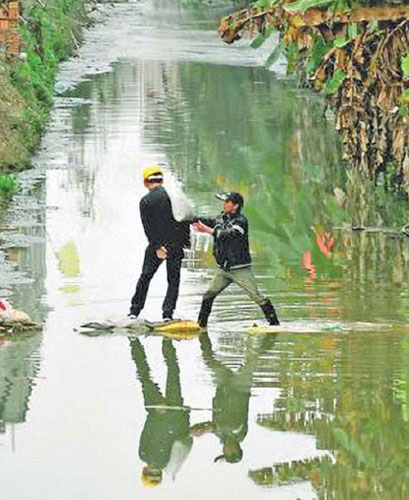Society
Fuzhou plans to restore romance of waterways
By Hu Meidong and Wei Tian (China Daily)
Updated: 2011-03-03 08:35
 |
Large Medium Small |
|
 |
|
Two workers put sandbags into Hongzhen River in Fuzhou, Fujian province, on Tuesday, to build a cofferdam before removing the silt. Provided to China Daily |
FUZHOU - Fed up with endless traffic jams and a congested subway? How about sailing your way through the downtown bustle instead?
Fuzhou, capital of East China's Fujian province, is carrying out an ambitious plan to renovate its 163-kilometer-long urban canal system. The project is expected to re-establish the city's waterway transport in the next few years, and in the long term its charm as the "Oriental Venice".
"The crisscross water veins flowing through Fuzhou have been functioning as important water routes as well as flood control facilities since the Tang Dynasty (AD 618-907)," said Zhang Fan, deputy director of the Fuzhou construction commission, who is in charge of the city's largest public project this year.
| ||||
In ancient times, people enjoyed the cool by the river during summer days, and sailed their canoes to the pub when night fell, as the old poems describe.
"And more importantly, the waterways helped to bring in several historical changes, such as the prosperity of commercial markets and the Westernization Movement in the 1860s," Zhang said.
But with the boom in wheel transport in the early 20th century, traditional canoe transport was gradually abandoned, and some rivers were even filled in to make way for wider roads.
With a poor drainage system, the mass industrialization and rapid growth in population in the 1980s led to the waterways being used as waste pipes for nearby factories and residents.
"We used to swim in the water when we were young, but now I have to cover my nose to escape from the stink," said Jiang Baozhang, who has been living by Antai River, one of the city's 107 waterways, for more than half a century.
"The idea of renovation is good but I'm afraid the project will become a mere formality, just like before when they brought in freshwater to wash the riverbed. After a while it'll be all the same again," Jiang said.
Zhang admitted confusion in previous efforts due to the lack of an overall plan, but he said the authorities are being more farsighted this time, with problems to be solved one by one. "Illegal discharge to the river is the main cause of worsening water quality, so sewage interception will be our first priority," Zhang said.
"Unauthorized buildings on the original course of the rivers are another headache. Persuading people that we must move them also requires much time and effort."
Urban planning expert Wu Ming said renovating urban waterways was a complex project that involved many aspects such as hydromechanics, ecology, urban planning and architecture.
"So a sound plan should be built on a thorough investigation of the entire system," he said. "There is no quick success."
Zhang said now that all waterways have been surveyed the authorities were inviting bids for the design of some major waterways such as Guangminggang (Light Harbor). Adding cultural elements like old valleys and dragon boat racing will be the main elements considered in the selection.
"Apart from dredging up and replenishing the waterways, we'll also landscape along the river," Zhang said. "The canal system will be Fuzhou's new greenway."
China Daily

